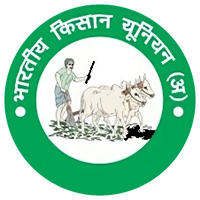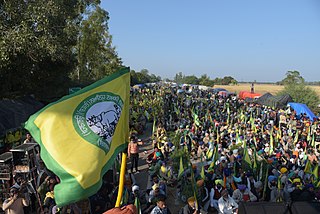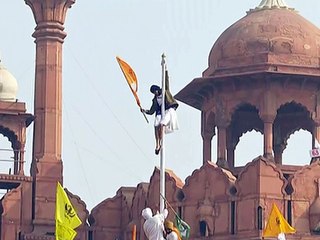
Chaudhary Charan Singh was an Indian politician, peasant leader, author and a freedom fighter who briefly served as the prime minister of India from July 1979 to August 1979. Singh was principally known for his land and agricultural reform initiatives was Member of Parliament (MP) for Baghpat. During prime ministership he was a member of the Janata Party (Secular). He served as the chief minister of Uttar Pradesh as a member of Bhartiya Kranti Dal. He also briefly served as the deputy prime minister of India from January 1979 to July 1979 as a member of the Janata Party. Singh is widely regarded as the "Champion of Farmers", after his life has been dedicated to advocating for the well being and rights of farmers.
The Dharam Yuddh Morcha was a political movement launched on 4 August 1982, by the Akali Dal in partnership with Jarnail Singh Bhindranwale, with its stated aim being the fulfillment of a set of devolutionary objectives based on the Anandpur Sahib Resolution.

The Essential Commodities Act (ECA) is an act of the Parliament of India that was established to ensure the delivery of certain commodities or products, the supply of which, if obstructed due to hoarding or black marketing, would affect the normal life of the people. This includes foodstuff, drugs, fuel etc. This act was modified by the Essential Commodities (Amendment) Act, 2020 as part of the 2020 Indian farm reforms.
Sardar Bhupinder Singh Mann, born in Gujranwala on 15 September 1939 was nominated to the Rajya Sabha in 1990 by the Honorable President of India as recognition to his contribution to the farmers' struggle. He served from 1990 to 1996. His family moved from Lyallpur, now Faisalabad during partition to settle at Batala. His father S. Anoop Singh was a prominent landlord of the area and Chak 207 in Faisalabad is still named after him.

Om Prakash Dhankar also known as O. P. Dhankar, is an Indian politician and social activist, belonging to the Bhartiya Janata Party (BJP) and formerly is the President of Bhartiya Janata Party, Haryana. He was a Cabinet Minister in the BJP run Government of Haryana till 2019.

Parkash Singh Badal was an Indian politician and Sikh rights advocate who served as the 8th Chief Minister of Punjab from 1970 to 1971, from 1977 to 1980, from 1997 to 2002, and from 2007 to 2017, the longest serving Chief Minister of Punjab till date. He was also Leader of the Opposition in the Punjab Legislative Assembly from 1972 to 1977, 1980 to 1983 and from 2002 to 2007 and the 11th Union Minister of Agriculture and Farmers' Welfare in the Morarji Desai ministry from 1977 to 1977. He was the patron of Shiromani Akali Dal (SAD), a Sikh-centered regional political party, and the president of the party from 1995 to 2008, when he was replaced by his son Sukhbir Singh Badal. As the patron of SAD he exercised a strong influence on the Shiromani Gurdwara Parbandhak Committee and Delhi Sikh Gurdwara Management Committee.

Sandeep Singh Sidhu, also known as Deep Sidhu, was an Indian film actor and Sikh activist. He worked in Punjabi films, starting his acting career with the film Ramta Jogi produced by Dharmendra under his banner Vijayta Films.

Bharatiya Kisan Union (BKU) is a farmer's representative organisation in India. It was founded by Chaudhary Charan Singh from the Punjab Khetibari Union which became its Punjab branch. The union is affiliated to the All India Kisan Sangharsh Coordination Committee and Via Campesina. The national headquarters of the union is located in Sisauli, Muzaffarnagar, Uttar Pradesh.
The Indian agriculture acts of 2020, often termed the Farm Bills, were three acts initiated by the Parliament of India in September 2020. The Lok Sabha approved the bills on 17 September 2020 and the Rajya Sabha on 20 September 2020. The then President of India, Ram Nath Kovind, gave his assent on 27 September 2020.

The 2020–2021 Indian farmers' protest was a protest against three farm acts that were passed by the Parliament of India in September 2020. The acts, often called the Farm Bills, had been described as "anti-farmer laws" by many farmer unions, and politicians from the opposition who said that it would leave farmers at the "mercy of corporates" since the farmer-trader disputes were taken to SDM instead of judiciary. The protests demanded the creation of a minimum support price (MSP) bill, to ensure that corporates cannot control the prices. The Union Government, however, maintained that the laws would make it effortless for farmers to sell their produce directly to big buyers, and stated that the protests are based on misinformation. Related endemic legacy issues include farmer suicides and low farmer incomes. Despite India being largely self-sufficient in foodgrain production and having welfare schemes, hunger and nutrition remain serious issues, with India ranking as one of the worst countries in the world in food security parameters. Due to unfulfilled previous demands 2024 Indian farmers' protest started on 13 of February 2024.
The 2020 Indian general strike was a mass general strike that was held across India on 26 November 2020.
Trolley Times is a four-page biweekly newspaper in Gurmukhi and Hindi. It was founded on December 18, 2020 to represent farmers at the Delhi-Haryana border protesting in response to alleged attempts by mainstream media to malign and misrepresent the 2020–2021 Indian farmers' protest.
Samyukta Kisan Morcha (SKM), formed in November 2020, is a coalition of over forty Indian farmers' unions to coordinate satyagragh against the three farm acts initiated in September of the same year.

The 2021 Farmers' Republic Day protest was a protest on 26 January 2021 at Delhi. Part of the 2020–2021 Indian farmers' protest. The protestors deviated from the parade to take the parade towards Red Fort. The protest took place on the 72nd Republic Day against the decision by Narendra Modi-led National Democratic Alliance (NDA) to implement three farm acts.

Ashok Dhawale is an Indian peasant leader and the National President of All India Kisan Sabha. He is one of the leaders of the Samyukta Kisan Morcha (SKM) which led a historic one-year long struggle that succeeded in getting the three Farm Laws repealed by the Central Government. He is also one of the leaders of the famous AIKS-led Kisan Long March in Maharashtra of 50,000 farmers from Nashik to Mumbai. He is a Polit Bureau Member of the Communist Party of India (Marxist). He was also the State Secretary of the Communist Party of India (Marxist) in Maharashtra for ten years.

The 2024 Haryana Legislative Assembly elections were held in Haryana on 5 October 2024 to elect all 90 members of the Haryana Legislative Assembly.
Gurnam Singh Charuni is a farm union leader and politician in the Indian states of Haryana and Punjab. He is the chief of the Bharatiya Kisan Union (BKU) in Haryana, and the founder of Sanyukt Sangharsh Party.

Balbir Singh Rajewal is an Indian farm union leader and politician from Ludhiana, Punjab. He is founder of Bharatiya Kisan Union (Rajewal) and the Chief Ministerial candidate of Sanyukt Samaj Morcha party for the 2022 Punjab Legislative Assembly election. Rajewal is known for his active participation in 2020-2021 Indian farmers' protest.
The All India Kisan Mahasabha (AIKM) is the peasants' front of the Communist Party of India (Marxist-Leninist) Liberation, and works for farmers' rights and the anti-feudal movement in India. AIKM and AIKM's Punjab-based farmers' union Punjab Kishan Union have played one of the biggest roles on 2020-21 farmers' protest.
Kisan and Khet Mazdoor Congress is a trade union of agricultural labourers in India. KKMC is the Peasant's wing of Indian National Congress. Sukhpal Singh Khaira is the Chairman of KKMC since 2022. Sukhpal Singh Khaira is the third time MLA and former Leader of Opposition in Punjab Legislative Assembly.










